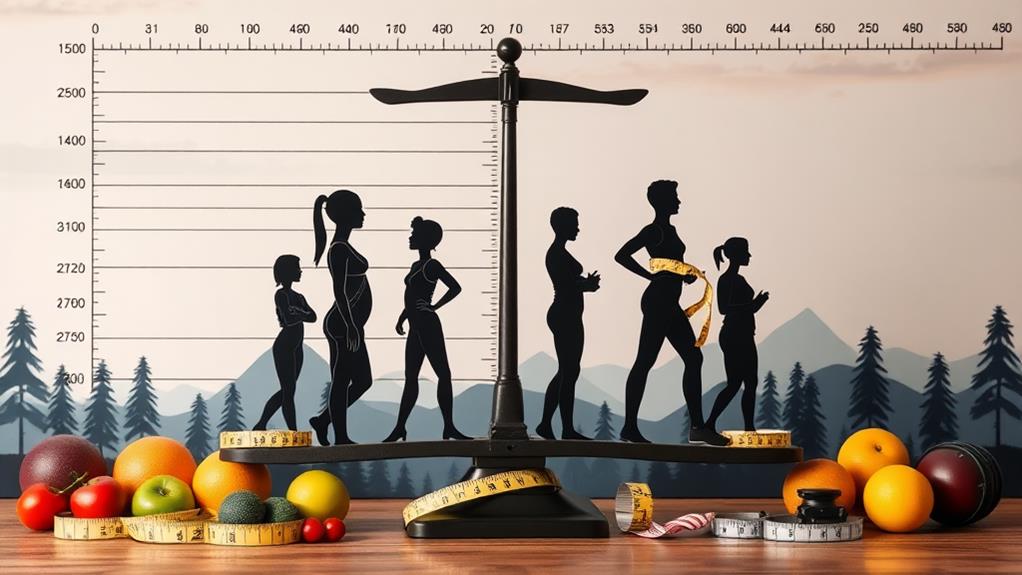Finding your ideal weight for your height can seem intimidating, but it's essential for your overall health. You might rely on methods like BMI or the Hamwi formula, yet these tools only scratch the surface. It's important to reflect on factors such as your gender, muscle mass, and lifestyle, which can greatly influence your ideal weight. As you explore these dimensions, you might uncover insights that challenge common assumptions about weight and health. What if there's more to your weight than just numbers? Let's uncover what that means for you.
Understanding Ideal Weight

When it comes to understanding ideal weight, it's important to realize that there's no one-size-fits-all answer. Your ideal weight can depend on several factors, like your height and body composition.
You might hear about the Body Mass Index (BMI), which helps determine a healthy weight range for adults. For most folks, a BMI between 18.5 and 24.9 is considered healthy, but again, it's not the whole story.
Individual factors play a big role too. Things like your age, body frame size, and muscle mass can change what's ideal for you. For example, if you're an athlete with more muscle, you might weigh more but still be perfectly healthy. That's because ideal weight doesn't account for body composition differences.
To get a fuller picture of your health, it's smart to look beyond just the scale. Health assessments, including waist circumference and body fat percentage, can give you better insights into your overall health.
Methods for Calculation
Calculating your ideal weight can be done through various methods, each with its own unique formula. One popular method is the BMI, or body mass index. You can find your BMI by dividing your weight in kilograms by your height in meters squared. A healthy BMI range is generally between 18.5 and 24.9.
But that's not all! You can also use weight charts, which compare your height and weight to find your ideal weight. For a more personalized approach, consider formulas like the Hamwi, Devine, Robinson, or Miller formulas.
For example, the Hamwi formula says to start with 48.0 kg for men and 45.5 kg for women, then add 2.7 kg for each inch over 5 feet for men, and 2.2 kg for women.
Another fun method is the waist-to-height ratio. If your ratio is below 0.5, you're likely in the healthy zone!
Factors Influencing Weight

What factors truly shape your ideal weight? Well, it's not just about those numbers on the scale! Your height plays a big role, as taller folks usually weigh more.
Gender matters too, since men often have greater muscle mass, which means they might weigh more than women, even if they look similar.
But wait, there's more! Body composition is key. If you have more muscle mass, you might weigh more but have a healthier body fat percentage. It's like being a superhero in disguise!
Health conditions can also shift your ideal weight. For example, men might store fat around their tummies, while women often carry it in their hips and thighs.
Don't forget lifestyle factors! Your activity level and diet can really impact your ideal weight. Eating veggies and running around can help you manage your weight better.
Importance of Body Composition
Understanding body composition is essential for anyone looking to achieve ideal health and fitness. It's not just about your weight; it's about how much of that weight is fat versus muscle. By focusing on your body fat percentage, you can see if you're within healthy ranges—under 30% for women and 25% for men. This matters because having more muscle mass usually means better health and fewer health risks!
You might be surprised to learn that the body mass index (BMI) isn't always accurate. It can mislabel fit people with high muscle mass as overweight. Instead, checking your waist circumference can give you clues, too! Keeping it under 88 cm for women and 102 cm for men helps reduce health risks tied to abdominal fat, which isn't friendly to your overall health.
Limitations of Weight Calculators

Many people rely on weight calculators to determine their ideal weight, but these tools have significant limitations. For starters, weight calculators mainly focus on height and gender, ignoring important factors like body composition, muscle mass, and bone density.
Have you ever heard of Body Mass Index (BMI)? It's a common method used in these calculators, but it doesn't tell the whole story. BMI lumps muscle and fat together, often mislabeling fit folks as overweight or even obese!
Then there's the issue with ideal weight ranges. Different calculators use different formulas, which can lead to conflicting results. That's not very helpful, is it?
Plus, weight calculators usually overlook your health conditions and unique body shape, making personalized health assessments tough. They also don't consider lifestyle factors, like how active you're or what your personal health goals are.
This means you might miss out on a thorough health evaluation that could give you a better picture of your well-being. So, while weight calculators can be fun to play around with, remember they're not the be-all and end-all when it comes to your health!
Strategies for Maintaining Weight
Maintaining a healthy weight requires a proactive approach that balances diet and exercise. To kick things off, focus on your calorie intake. You'll want a balanced diet packed with nutrients, so your body gets what it needs without too many extra calories.
Regular physical activity is key too—think of it as your weight management buddy. Aerobic exercises and strength training help preserve muscle mass, which is super important for your metabolism.
Setting small, achievable weight loss goals, like losing 1-2 pounds per week, not only makes the process manageable but also keeps you motivated. You can track your food intake using handy apps that make counting calories a breeze. This way, you stay accountable and can make smart choices.
Don't forget, seeking support from health professionals or nutritionists can really help. They can give you personalized strategies that fit your lifestyle, making your journey smoother.
Plus, having someone cheering you on can boost your chances of success! Remember, it's all about enjoying the journey while aiming for those health outcomes you want. Keep it fun, and you'll do great!
Understanding Body Shape

Body shape plays a significant role in how we perceive ourselves and how others perceive us. You might be an ectomorph, tall and slim, or an endomorph, with a rounder frame, or maybe you're a mesomorph, muscular and athletic. Each of these body types influences your fitness goals and health assessments.
You see, even if two people have the same height and weight, they can look quite different due to muscle mass and body fat distribution. Muscle is denser than fat, so your body composition can change your overall appearance.
Plus, understanding your body fat percentage is crucial for your overall health. For women, a healthy range is under 30%, while for men, it's under 25%.

